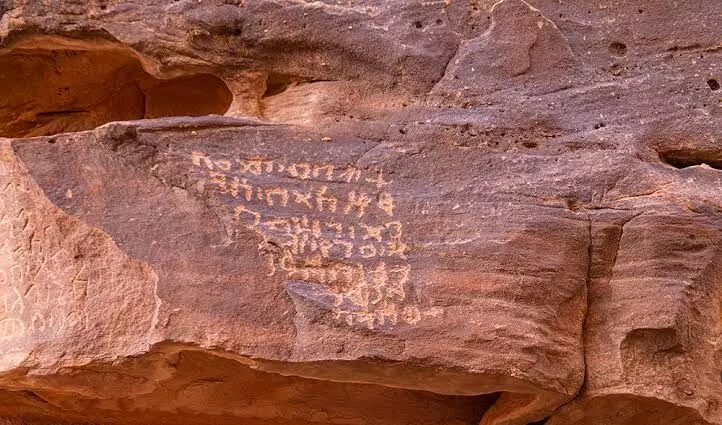
Early rock inscriptions shed lights on secrets of Arabia's ancient love, happiness
text_fieldsMakkah: The Arabian Peninsula is seen by much of the world as unmapped and unexplored particularly concerning its ancient history. However, as researchers begin to dig deeper and the archaeological record is more fully documented, several awe-inspiring discoveries have revealed that the region has an extremely rich cultural heritage.
According to Dr Salma Housawi, professor of ancient history at King Saud University, the ancient inscriptions on rocks that have been discovered throughout the Arabian Peninsular are revealing evidence into the earliest Arabic cultures, including economic and social conditions.
She noted that the inscriptions have further revealed evidence even into people's thoughts on love, marriage and happiness.
As per a report by Arab News, Hawsawi said that one can extract historical information from these inscriptions as they reflect the feelings of love, fear, longing, sadness and happiness felt by people back then.
She added that it is also why inscriptions are regarded as a true witness of what the people of that era have experienced, which highlights the region's cultural depth.
She further said that the engravings throw light into the early religious belief and ritual performances, as well as details of professions, crafts and currencies, and also highlight the professionalism and skill of the engravers.
Terming the art of 'writing' as an invention of mankind, Hawsawi told it is a means of exchanging ideas and knowledge, as well as discussing it within societies, regardless of class, beliefs and sects."
The practice spread due to the people's need to codify their laws, and trade contracts. Writings started off as drawings, then symbols and syllables, before taking on the form of an alphabet, she said.
Hawsawi said that writing and engraving were regarded as professions. "Writing, in general, illustrates the level of civilization and education that Arab society reached, and also demonstrates writing's role in the progress of humanity."
She further said that writing developed through two stages — "the pre-alphabet stage, which is figurative writing or depicting material things in the human environment to denote moral aspects through rock drawings. Then, after that, symbolic with syllabic sounds."
Across the Arabian Peninsula, written inscriptions offer clues to the Arab communities that lived in various areas. Some of the inscriptions had a religious aspect, focusing on the names of gods and religious rituals, while others were more social, discussing personal status, marriage, divorce, and people's names.
Engravings also provided details of tribal names and locations, as well as professions and crafts, trade provisions, currencies, and exports and imports.
Some inscriptions were related to politics and featured the names of kings and rulers, wars and the rise and fall of nations, while others are considered memorials and represent an important source of knowledge on the region's history and culture.
This further gives an idea of the level of knowledge and culture reached by the societies and the attention they paid to writing and documentation.
Depending on the writer's skill, as well as on the facades of temples, houses and even gravestones, Hawsawi said that inscriptions can be found on rocks in an arranged or random manner.
Owing to its distinctive scripts and range of topics, writing in Arabian Peninsula societies differed from that of other cultures.
According to Hawsawi, unlike other civilizations that focused on codifying political events, life and related events were recorded in the ancient inscriptions from the Arab Peninsula.























